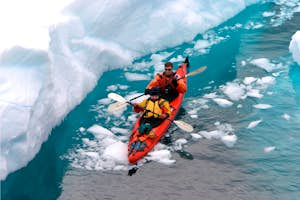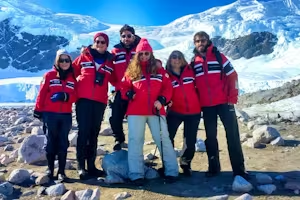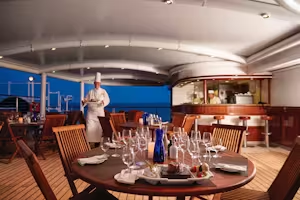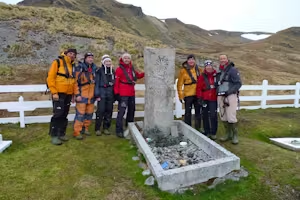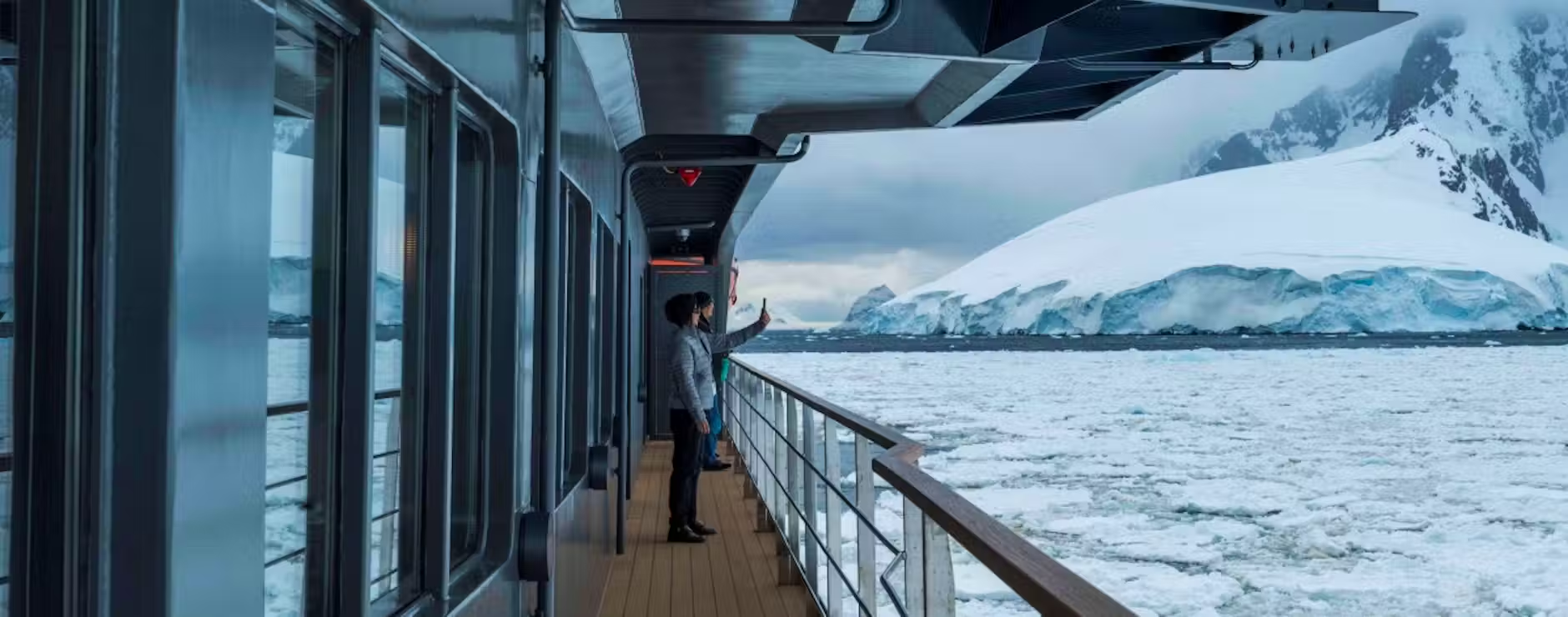Your Antarctic ship guide
This guide introduces what life is generally like on an Antarctic expedition. For practical details about the specific vessel you will travel on, find your ship guide within the My Trip section of the My Trip page in your Adventure Planner. Simply scroll down until you see your vessel name and click the link.
Communications
Signal
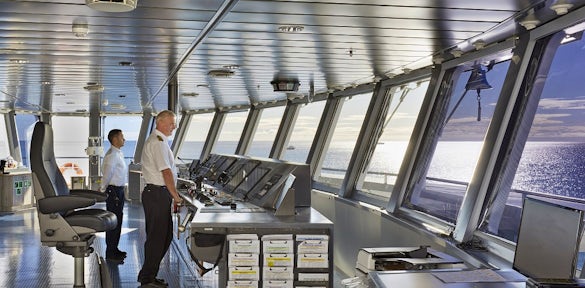
The bridge
Staying in touch while travelling to one of the most remote places on the planet has drastically improved in recent years. However, as internet connection relies on satellites, keep in mind that service can be patchy. It may work perfectly for a day or two before the signal vanishes, so it’s best not to rely on it. We recommend using your trip as the ideal excuse for a digital detox!
The onboard connection is generally only suitable for light usage, not for heavy bandwidth tasks like uploading photos or streaming. It typically works well for sending occasional text updates, such as via WhatsApp or similar messaging apps.
We recommend letting friends, family and colleagues know that your connection might be patchy and to not be alarmed if you’re unavailable for a few days at a time. In true emergencies, they can get in touch with the ship’s captain by satellite phone to pass on an urgent message. You can find this contact information in the final documents we will send out to you.
WIFI
Many ships now have reasonably good WIFI, with the strongest signal usually in the public areas and reception. It is worth moving around the vessel if you are struggling to connect.
If internet access is not provided free of charge on your vessel, you can generally purchase it at the ship’s reception, with fixed price 'cards' giving you a predetermined chunk of data allowance. The cost will then be added to your tab to settle up at the end of the cruise. This exact process will be explained on board in one of your preliminary briefings.
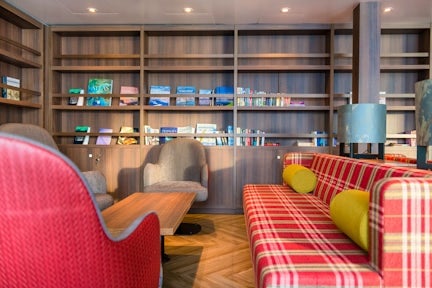
Polar library
Electricity and sockets
The plug sockets on Antarctic ships vary. Depending on your vessel, they may be US style with two flat pins or European style with two round pins. Your ship page in your Adventure Planner will explain which type is used on your vessel.
When travelling through South America before or after your Antarctic expedition, you may need an adaptor to charge your electronics. Please read our practical guides to travelling through Chile and Argentina for more information on the socket types used in each country.
Language
Once on board your Antarctic ship, English will be the main language spoken, unless you’re on a bilingual departure. In this case, announcements may be made in two or more languages.
If travelling more widely in South America pre or post-Antarctica a good English-Spanish dictionary is likely to come in handy, and knowing a few basic phrases will stand you in good stead. However, most Chilean and Argentinian people in the tourism industry speak very good English.
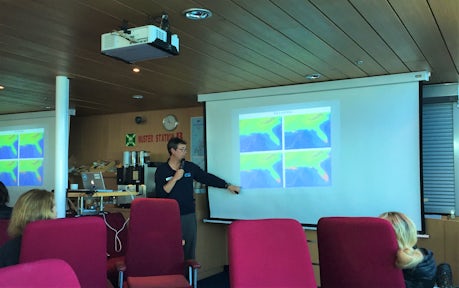
What our customers think of life on board
Cabin & ship facilities
Cabin facilities

Your cabin will be comfortably kitted out with all of the trappings of a regular hotel including:
- Towels and toiletries
- Hairdryer
- A small desk area
Some ships and higher cabin categories also provide:
- Dressing gowns
- Mini fridge
- Flat-screen TV
Most cabins have individual controlled thermostats, so you can adjust the temperature of your cabin easily.
We recommend not bringing any glass bottles or fragile objects, which may get damaged with the movement of the ship. Stow away cameras, binoculars and other delicate items when not in use. Many ships will also provide grippy matting on flat cabin furniture surfaces to help keep your belongings in place.
Once you have unpacked, your suitcases can generally be tucked away underneath your beds. For this reason, we recommend soft-sided suitcases, rather than hard shell.
Communal areas
Ships usually have a public lounge area – often with a bar – where you can relax. These communal spaces are typically welcoming in atmosphere. They are the perfect spots for unwinding with a book solo or chatting to other travellers.
On most vessels, these lounges also double up as indoor observation areas with panoramic windows where you can watch the scenic goings-on outside.

Wellness areas
Most ships have a gym with basic equipment for keeping on top of your fitness regime. Others feature more extensive wellness facilities: think open-air hot tubs for simmering in the heat as you gaze at passing icebergs.
Certain vessels are even equipped with spa areas including window-lined saunas and massage rooms. If your ship offers treatments, generally these will accrue an extra fee charged to your shipboard account.

Medical facilities
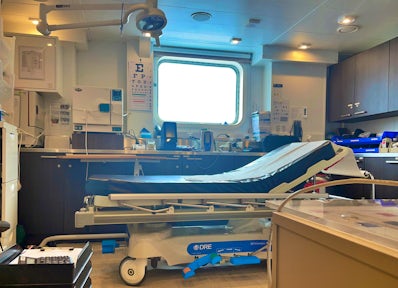
A qualified English-speaking doctor will be available aboard your vessel to help with any minor ailments, seasickness or other issues. Just please keep in mind that the onboard medical equipment is limited. If you are taking any medication, you will need to bring your own supply.
We also recommend packing seasickness medication with you after talking over what is best suited for you with a medical professional before your journey. Most anti-seasickness medications are much more effective if you take them before the onset of nausea.
In the rare event of a serious emergency, the captain and expedition leader will decide on the best course of action.
Laundry
All ships have an onboard laundry service with a typical turnaround of 24 to 48 hours.
Prices vary but are generally in line with what you might find in an upmarket hotel, given the remote location and challenges of running a laundry 600+ miles from the nearest town.
All items are washed at the same temperature and dried before being returned to the cabin, so it might be best to handwash any delicate fabrics in your bathroom basin.
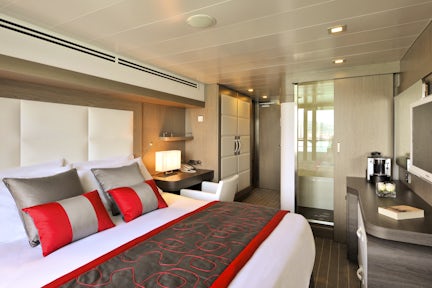
Other facilities
Mudroom
Most Antarctic ships have a mudroom on board where you will prepare to leave the vessel for excursions. On some vessels these will have lockers for storing your outdoor gear.
Shop
Your vessel might have a small onboard shop stocking a combination of practical items (such as clothing, cold weather gear, sunglasses, etc.) and souvenirs.
Elevators
Elevators are usually available on Antarctic vessels but may not be in use during rough seas.
Smoking policy
It is usually prohibited to smoke inside the ship. However, there will be at least one designated smoking area.
Things to do on board
Learn about Antarctica in lectures
Expert guides run educational lecture programmes on board all polar expedition ships. During these sessions, you can look forward to learning about everything from Antarctic wildlife to the geography of the continent. In the morning, you might listen to an ornithologist discuss the nesting habits of gentoo penguins, while in the afternoon you will perhaps hear a historian talk about legendary polar explorers.
On some smaller or older ships, the main lounge area doubles up as the lecture theatre. On others, there’s a dedicated room equipped with state-of-the-art visual technology.
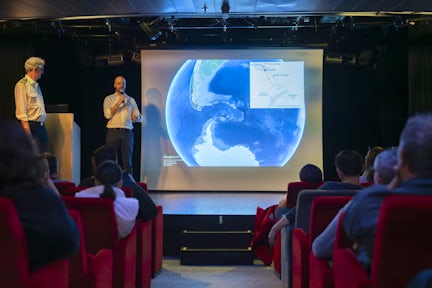
Spot wildlife out at sea
Most expedition vessels are blessed with observation lounges featuring panoramic windows, but the outdoor deck areas are still the top places for taking advantage of impromptu wildlife sightings. We recommend spending as much time in the open air as possible to soak up the spectacular views from every angle.
If you would rather stay indoors, keep in mind that tannoy announcements will inform you of any major moments – such as whale sightings – so you should still have time to rush outdoors and catch any action.
Guides are usually found out on deck, explaining more about the passing wildlife or scenery. Chatting with the expedition team members is invaluable as they can share information about Antarctica that will add to the depth of your experience.
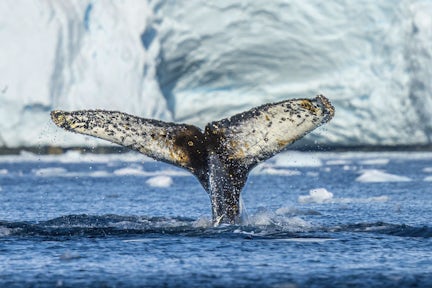
Peruse books in the polar library
Most ships have a dedicated area where you can borrow a book to read during your voyage. Books with a polar theme are, of course, commonly stocked here, whether historical accounts of Antarctic explorers or wildlife reference guides. We recommend rifling through the racks to help expand your knowledge of the places you will visit.
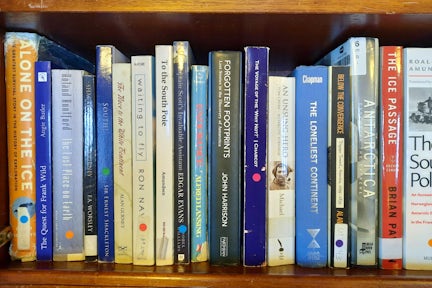
Experience the polar plunge
The polar plunge is a rite of passage on an Antarctic expedition. As you might have guessed from the name, it's when your ship arranges for you to leap into the White Continent's icy waters. You will either be attached to the vessel via a safety rope or your expedition staff will take you ashore so you can run into the freezing sea at your own pace. Either way, it's an exhilarating experience.
It's worth asking on board whether your ship will organise a polar plunge – most do – and which shape or form this will take.
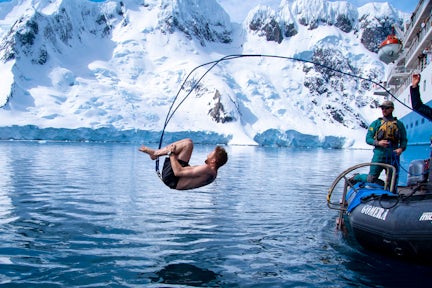
Take part in Citizen Science
A handful of ships run Citizen Science programmes where you can get involved in projects designed to preserve Antarctica for future generations. This might include taking part in cloud-spotting and albatross-counting surveys or collecting phytoplankton samples during a zodiac boat cruise. It’s an excellent way to contribute towards the greater good during your expedition.
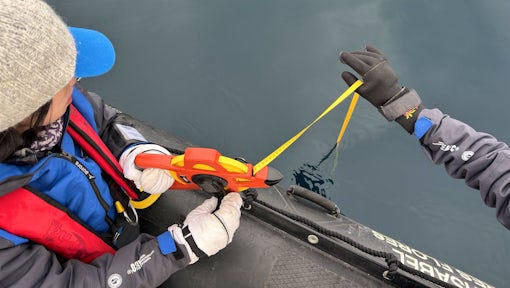
Taking part in citizen science on an Antarctic recce
Watch the Captain at work in the bridge
You might be lucky enough to sail on a ship with an open bridge policy, where you can watch the Captain and his or her team flex their navigational skills. These fascinating visits will give you a real-life glimpse into how an expedition ship runs.
It’s generally down to the Captain’s discretion whether guests are permitted within the bridge, so it’s worth asking about access once you’re on board.

Food & drink
What to expect on board
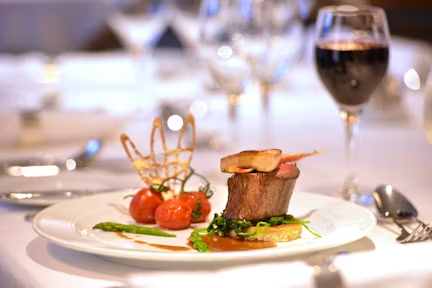
On expedition ships the food is tasty and plentiful. Smaller vessels generally have one main dining area serving all three meals, which makes for great conversations and a buzzing atmosphere after the day's adventures are done. Larger or more luxury-focused ships may have a range of dining venues, as well as the opportunity to order room service.
Breakfast is typically always a buffet, while lunch and dinner normally have table service provided. Buffet food may be served to your plate by the dining room team, rather than self-service. Dinner is generally table service and is often three courses with a choice of both starter and main course. There is always a vegetarian option and, in our experience, typically both a meat and a fish option for the main course.
On some ships, the onboard team will organise al fresco dining such as a barbecue if the weather is kind enough.
Tea and coffee are always available, with most ships having a station where you can help yourself at any time. We recommend bringing a travel-style thermos mug with a lid, which helps with getting hot drinks back to your seat when the ship is moving. All ships provide drinking water, and there is likely to be at least one bottle refilling station in a public area, where you can top up at any time. Single-use plastic bottles are avoided wherever possible for environmental reasons.
You can buy alcoholic and non-alcoholic drinks on the majority of Antarctic vessels, although bar opening times will vary. Some vessels offer house wines, beer and soft drinks with dinner; a handful are all-inclusive voyages where beverages are available free of charge at most times of day. For information on your specific trip, take a look at the inclusions in your Adventure Planner.
Dietary requirements
Expedition ships are experienced at catering to several dietary requirements. However, please be aware that because of the ship's small galley kitchens and challenging supply chain, not all requirements can be catered for, so specific kosher and vegan options are generally unavailable.
Vegetarian and gluten-free options will often be labelled to make them easily identifiable.
You will need to make the ship aware of any dietary requirements prior to embarkation by filling in the pre-voyage forms, which include questions about whether you have any food requests. If you have a strong food allergy, we recommend you introduce yourself to the hotel manager or head waiter before the first meal.
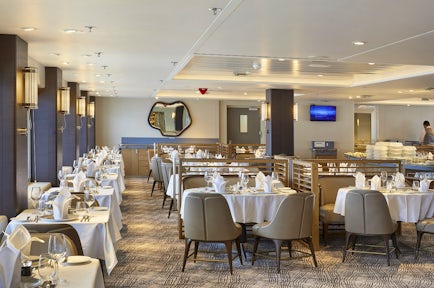
The restaurant



